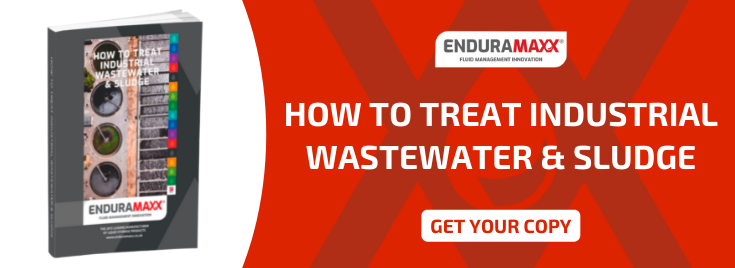WASTEWATER AND SLUDGE PROCESSING
Businesses involved in meat processing, food production, fruit and vegetable processing, and other industries, often use large quantities of process water for preparing products, washing materials, cleaning, and other tasks. The by-products of these processes are wastewater and sludge, which often contain high quantities of dissolved oxygen, chemical and biological residues, and suspended solids (e.g. silt). Before being injected into the sewers and returned to the mains water system, these waste products have to be treated to remove heavy particles and potential contaminants.
How to process wastewater
Wastewater is any untreated water left over from an industrial or agricultural process, and usually contains a variety of organic and inorganic contaminants. This water has to be processed and treated before it can be reused or released to the mains, and the first stage of this is storage in purpose-built tanks to enable any heavy particles to settle out. The water is then put through various levels of filtration (e.g. reverse osmosis) and purification (e.g. deionisation, or demineralisation) to remove different categories of contaminants.
How to process sludge
Sludge is the colourful term used to describe all the solid material left over from water treatment, typically consisting of sediment, water, and biological waste. Sludge processing first involves reducing the water content in the sediment by means of progressive stages of flocculation in a mixer tank. The remaining residue is then exposed to thermochemical or anaerobic digestion in a settlement tank under controlled processing conditions. This converts organic matter (which contains pathogens, methane, carbon, and nitrates that could damage the ecosystem or pose a health threat) to inert sludge biosolids that can be disposed of safely or re-used in agriculture. These biosolids are potent sources of crop nutrients and are a sustainable means of returning carbon to the land while reducing harmful greenhouse gas emissions.
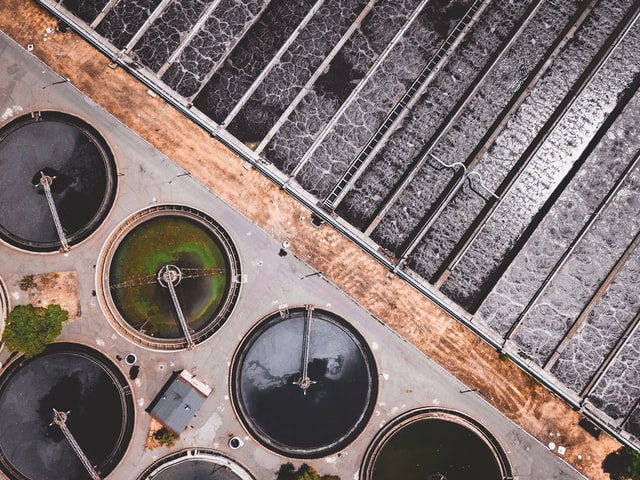
This guide explores the practicalities of wastewater and sludge management for food production, agricultural, and industrial businesses, and how businesses can meet their legal disposal requirements while minimising processing costs.
THE PROBLEM - CONTENT TO DISCHARGE
In the context of the UK’s commitment to zero carbon by 2050, wastewater and sludge disposal is a loaded topic, with the potential to cause both pollution and environmental damage. Many local water authorities, therefore, don’t let businesses discharge wastewater without testing it for harmful trade effluent levels. Under the terms of the Water Industry Act (1991), businesses require an environmental Consent to Discharge permit from the Local Authority to release trade effluent into the public sewer system.
To attain this consent, the onus is on businesses to process wastewater and sludge to the point where the effluent complies with safe levels of regulated substances. To acquire a standard rules permit, you will need to conduct a risk assessment that outlines the potential environmental hazards associated with your plant and the mitigation strategies you put in place to manage them effectively. This will flow into a management system, which is a written set of processes and safeguards you will implement on your premises to reduce the risk of contamination and pollution.
More information about consent to discharge can be found on the following gov.uk pages:
- Permit conditions – click here
- Operator requirements – click here
- Information about management systems – click here
- Information about risk assessments – click here
THE SOLUTION - WASTEWATER TREATMENT SYSTEMS
1) Use a wastewater management contractor
The first, and potentially the easiest solution, is to outsource your requirements to a wastewater and sludge management company, who will send a tanker to your site to collect your wastewater at contracted intervals. Some contractors offer daily collections, which takes the pressure off your business to invest in treatment infrastructure, but it can work out very expensive.
2) Invest in a wastewater treatment system
The second option is to hire a water treatment company to design, build and install a wastewater and sludge treatment system. These can be custom designed for your needs and feature tanks and fluid management products designed by businesses such as Enduramaxx.
A water treatment consultancy company can create a turnkey system including all the plant you need to meet your specific needs, including (if necessary) water softening equipment, filtration systems, deionisation, reverse osmosis, UV sterilisation, demineralisation plants, and other specialist processes. An in-house water treatment plant allows you to treat wastewater and sludge on site, saving money and also meaning you can reuse a lot of your process water, reducing your water expenditure and improving your image for sustainability.
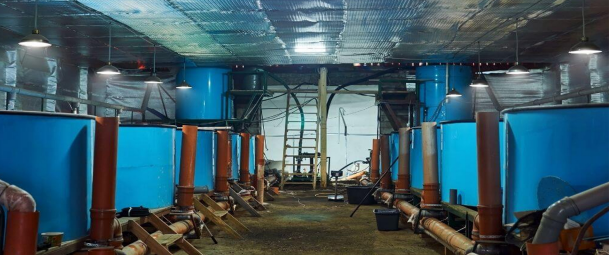
ENDURAMAXX WASTEWATER/SLUDGE TREATMENT SOLUTIONS
At Enduramaxx, we provide a range of specialist water treatment tanks that are compatible with all third-party water treatment and purification systems, and also offer a full effluent and process water treatment consultancy service. This includes all the tanks, pumps, instrumentation, and components you need to efficiently process sludge and wastewater on site, maximising your water reclaim rate.
How a typical wastewater and sludge treatment plant works
Let’s take a look at how a typical water treatment system works:
- An inlet pipe channels wastewater from the factory into two equaliser tanks for the storage of effluent.
- Separate tanks are included for the storage of alkaline and acid treatment products.
- Treatment products and effluent are channelled into a conical wastewater treatment tank, where additional treatments can be introduced through a separate primary water treatment dosing tank (e.g. for storing poly clays).
- After sedimentation, solid matter is pumped into a separate conical effluent sludge tank, and onwards through a filter press. The solid matter can then be reused, sold as fertiliser, or disposed of safely, while the clean and filtered water is siphoned into the sewer.
- The water from the treatment tank, separated from the solid matter sludge, is processed through additional stages of filtration and water treatment (including sterilisation, deionisation etc), and then returned to the sewer, or reclaimed for further use.
How Enduramaxx products can be incorporated into a treatment system
This outline example system includes several of our most popular water treatment and processing units
1) Holding buffer tanks
https://enduramaxx.co.uk/enduramaxx/holding-buffer-tanks/
Our high quality, rotationally moulded holding buffer tanks are available in 50 L, 100 L, 200 L, 300 L, 500 L, or 1000 L capacity. Each tank has customisable pipework and flanges, and is perfect for maintaining a consistent flow in process water systems, or acting as an equaliser tank to regulate liquid flow.
2) Water treatment dosing tanks
https://enduramaxx.co.uk/enduramaxx/primary-water-treatment-dosing-tanks/
Our food grade, chemical-resistant polymer primary water treatment dosing tanks are available in a range of sizes, from 50 L to 1000 L. Each tank incorporates a raised stepped lid to accommodate a chemical dosing pump, and can be used for a variety of purposes, including:
- Water purification
- Wastewater storage
- Chemical treatment and mixing
- Flocculation and disinfection
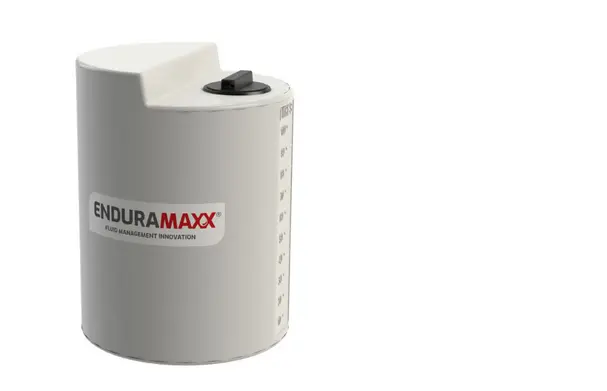
3) Closed top cone tanks
https://enduramaxx.co.uk/enduramaxx/30000-litre-5-degree-cone-tank/
Our range of high-capacity closed top conical tanks are available in capacities up to 30,000 L and have a 5° lower cone angle that allows full and rapid drainage of contents.
Engineered from insulated Polyethylene, each tank is supplied with a 2-inch drain outlet, with optional racking ports and a choice of frame. Our conical tanks are designed to help clarify liquids and encourage the separation of suspended solids, while avoiding the issue of vortexing. As part of a water and sludge treatment system, conical tanks help reduce the water content of sludge and encourage coagulation, prior to further chemical treatment or sterilisation.
All our cone tanks are WRAS-approved and Fluid Category 5 compliant.
4) Industrial effluent sludge tanks
https://enduramaxx.co.uk/enduramaxx/conical-industrial-effluent-sludge-tanks/
Our conical industrial effluent tanks are rotationally moulded from durable, chemically-resistant polyethylene as a superior storage solution for sludge and semi-solid waste products. Exterior ribbing provides additional strength for long-term storage, while the smooth interior inhibits the growth of bacterial, fungal, and algal infections.
Applications include:
- Sludge storage
- Sedimentation, clarification, and primary treatment of wastewater
- Dosing for chemical or biological treatments
- Chemical storage
- Wastewater storage, handling, and treatment
Tanks are available in capacities up to 30,000 L, and each tank can be purchased with a range of chemical treatment options, industrial mixers, liquid level sensors, fill pipes, and outlets.
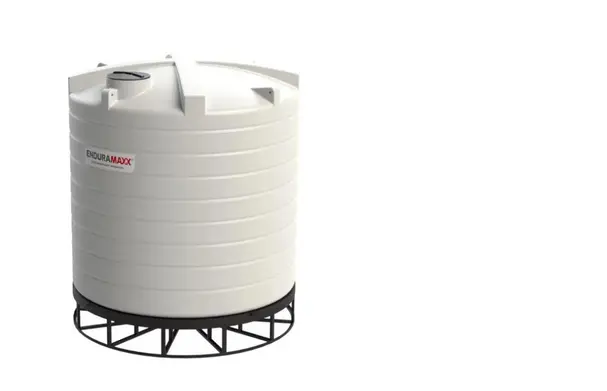
FIND OUT MORE
Enduramaxx are one of the UK’s leading manufacturers of water and chemical storage tanks for agricultural, construction, and industrial applications. Drawing on our range of over 40 Water Regulations Advisory Scheme (WRAS) and DWI-approved plastic storage tanks, we offer a bespoke system design service to meet the needs of each customer. For wastewater and sludge management, we provide personalised, cost-effective solutions to increase your processing output and reduce costs, helping you effectively deal with effluent and maximise your productivity.
All system design, product manufacturing, and supply is carried out in-house, and we work with several independent tank installation businesses to provide an end-to-end design, supply, and installation service.
Our accreditations & certificates
- Drinking Water Inspectorate (DWI) Regulation 31 approved
- WRAS approved for products and materials
- ISO 9001 accredited
- UKAS accredited
Contact us
To discuss your needs in person with one of our team, please call 01778 562 810 today.
